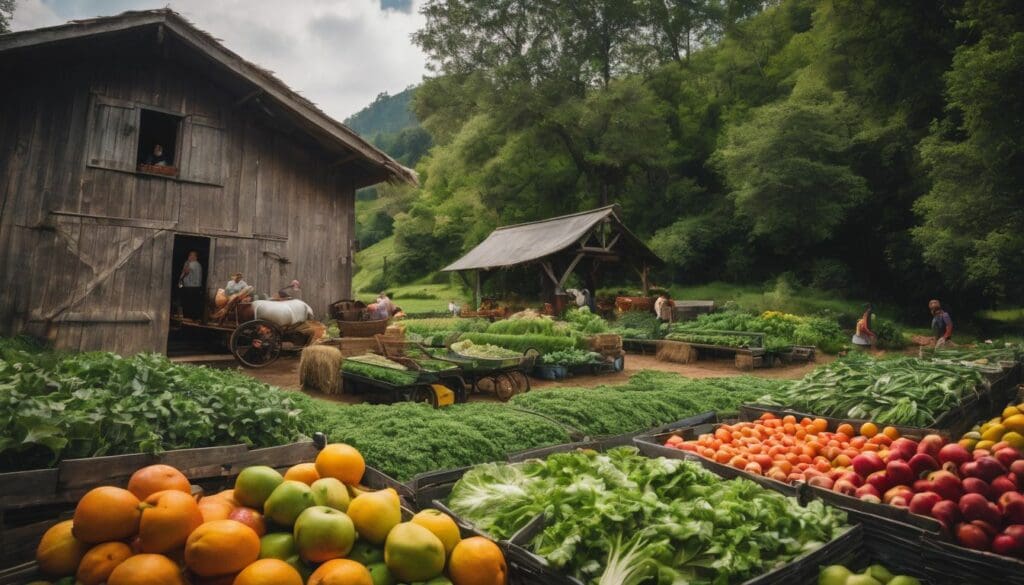Strolling down the supermarket aisles, one could easily find oneself mulling over whether splashing out a few extra quid on organic food is genuinely worthwhile. It’s a conundrum we’ve given much thought to as well, and it turns out that an eye-opening 58% of consumers opt for organic with their health front of mind.
In our latest blog post, we’re peeling back the layers of the organic movement; tracing its roots from unassuming origins all the way to the bustling shelves of your nearest shop. We’ll unveil what ‘organic’ truly encompasses – so pop the kettle on, settle in, and prepare to be enlightened!
Key Takeaways
- Organic food started gaining traction in the 1940s as a natural alternative to synthetic pesticide and fertiliser-reliant farming, with its popularity booming in the 1960s due to growing health and environmental concerns.
- The organic movement has led to stricter farming standards aimed at improving soil health and biodiversity, which have been increasingly adopted globally to meet consumer demand for eco-friendly products.
- While organic certification is seen as key for market trust, farmers face challenges such as high costs and complex processes; changes being called for include better transparency and support for small-scale producers.
- Surveys show farmers generally view organic practices positively and are open to adopting new methods though they desire simplification of certification processes; data indicates most believe it significantly benefits the environment.
- The future of organic foods looks bright with potential advancements like enhanced certifications, broader education on benefits, increased local farmer support, further development of sustainable agricultural techniques, and continued growth driven by consumer preference shifts towards healthy eating.
The History of Organic Food
Organic food has a rich history that dates back to the 1940s when the concept of chemical-free farming first emerged. It gained momentum in the 1960s and eventually led to the creation of the organic food movement, shaping the way we think about sustainable agriculture today.
Origins in the 1940s
In the 1940s, we saw the seeds of change sown for organic agriculture. It was a direct response to the rise of high-input farming that relied heavily on synthetic pesticides and fertilisers.
Concerned farmers and scientists began advocating for sustainable agriculture practices that would protect soil health and ecosystems. They aimed to grow food in ways that worked with nature instead of against it.
These pioneers promoted traditional crops and natural farming methods, setting the groundwork for what would become a global organic food movement. We embraced these early efforts because they echoed our respect for the environment and our desire to preserve it for future generations.
This was when we first recognised the value in locally sourced food, free from harmful chemicals, which led us down a path towards healthier food options and eco-friendly products.
Rise in popularity in the 1960s
During the 1960s, there was a significant surge in interest and demand for organic food products. Consumers became more aware of the potential health and environmental impacts of synthetic pesticides and fertilisers used in conventional farming.
This awareness led to a growing preference for natural, pesticide-free produce, prompting an upsurge in the production and availability of organic foods at local markets and stores.
As public concern over the use of chemicals in agriculture grew, so did the support for environmentally conscious farming practices. People began gravitating towards organic options as part of a broader movement towards healthier and sustainable food choices.
The creation of the organic food movement
The organic food movement emerged as a response to concerns over the negative impact of conventional farming practices on the environment and public health. Advocates sought alternatives to high-input agriculture, promoting environmentally friendly farming methods that prioritised soil health and biodiversity.
This movement gained traction in the 1960s, with an increasing number of consumers demanding pesticide-free, non-GMO foods. As a result, the organic food industry experienced significant growth, leading to the development of a wide range of organic food items and the rise of sustainable food options.
Today, this movement continues to drive progress towards healthier, eco-friendly food choices.
Benefits and Criticisms of Organic Certification
Organic certification ensures improved farming practices and promotes eco-friendly products. However, concerns over the certification processes have raised questions about the reliability of organic food labels.
Improved farming practices
Organic farming promotes healthy soil by using natural fertilisers and crop rotation to maintain its nutrient levels. By avoiding synthetic chemicals, it reduces water pollution and protects wildlife.
Organic farming also supports biodiversity by preventing the loss of species.
Farmers implementing organic practices must adhere to strict standards for processing, handling, and labelling organic products. Furthermore, ongoing developments in organic certification aim to improve consumer confidence in the integrity of organic products.
Survey data from farmers and experts help shape these advancements, ensuring that eco-friendly food choices continue to meet high standards.
Concerns over certification processes
Despite the improved farming practices in organic food production, there are valid concerns over certification processes. Consumers and advocates question the integrity of some certifications, worrying about loopholes that may allow non-organic products to be labelled as such.
The lack of consistent standards across different certifying bodies adds to the ambiguity and distrust surrounding organic certification.
Farmers also express frustration with the complex and costly nature of obtaining certifications, which can act as a barrier for small-scale producers looking to adhere to organic principles.
The Evolution of Organic Certification
We’ll explore the potential improvements and changes in organic certification, along with survey data from farmers and experts. This will give us a deeper understanding of how organic food products are evolving within the industry.
Potential improvements and changes
We can expect to see several potential improvements and changes in organic food certification:
- Enhanced transparency in the certification process, ensuring consumers have a clear understanding of the standards for organic products.
- Strengthened regulations to address concerns over fraudulent organic labeling, preserving the integrity of the organic certification system.
- Increased support for small – scale and local organic farmers, promoting sustainable agricultural practices and biodiversity.
- Continued research and innovation in organic farming methods, aiming to improve soil health and reduce reliance on synthetic inputs.
- Expansion of consumer education initiatives to raise awareness about the benefits of choosing organic products for personal health and environmental conservation.
- Collaboration between industry stakeholders and regulatory bodies to develop more stringent criteria for organic certification, aligning with evolving scientific knowledge.
Survey data from farmers and experts
Transitioning from the discussion on potential improvements in organic certification, we turn our attention to the valuable insights provided by those on the frontlines of organic agriculture. Farmers and experts alike have weighed in on the current state and future direction of organic food production. Their feedback is crucial as it shapes our understanding of the organic sector’s challenges and opportunities.
Here, we’ve compiled a summary of survey data in a straightforward table format:
| Survey Question | Percentage / Data | Key Insights |
|---|---|---|
| Satisfaction with current organic certification process | 60% Satisfied | Most find the process clear but seek simplification |
| Importance of organic certification for market access | 85% Very Important | Certification is critical for trust and sales |
| Barriers to obtaining organic certification | 50% Cost, 30% Complexity | Cost and procedural complexity deter many |
| Perceived impact of organic farming on the environment | 90% Positive Impact | Organic practices are widely viewed as beneficial for the environment |
| Openness to adopting new organic practices | 75% Open | Most farmers are willing to evolve with new standards |
This data reveals a community committed to organic principles, seeking continuous improvement to sustain their ecological and economic viability.
Conclusion
Organic food has had a significant impact on the food industry, providing consumers with healthier and environmentally friendly options. Moving forward, there are endless possibilities for organic foods to continue growing and evolving in the market.
Organic food’s impact on the food industry
Organic food’s impact on the food industry has led to a significant shift in consumer preferences, driving demand for environmentally conscious and healthier food options. The increased availability of organic produce has prompted industry-wide changes, creating a ripple effect that extends to conventional farming practices.
This movement towards pesticide-free, non-GMO foods reflects an evolving market preference for clean eating and whole foods, paving the way for the development of organic food items and eco-friendly products.
The growth of natural food products has initiated a broader conversation about the history of environmentally conscious farming and its impact on high-input agriculture. As public concern over pesticides continues to mount, there is growing support for eco-friendly alternatives as well as an emphasis on promoting sustainability within the food industry.
Future possibilities for organic foods
As organic food continues to gain popularity, the future holds promising possibilities for even more eco-friendly and sustainable options. We anticipate an increase in biocertified food products, further reducing soil erosion and depletion.
This progression towards healthier food choices aligns with the movement towards pesticide-free and non-GMO foods, offering a wider range of environmentally friendly products for consumers.
The development of innovative farming practices will lead to greater advancements in eco-friendly food options, reflecting a shift away from high-input agriculture. As consumers become more conscientious about their impact on the environment, we expect continued growth in the availability and variety of organic foods as well as increased awareness of the benefits they offer.
FAQs
1. What does the evolution of organic food products mean?
The evolution of organic food products refers to the progression from high-input agriculture to the advancement of pesticide-free, eco-friendly food choices that promote healthier options for consumers.
2. How have organic farming practices impacted our food?
Organic farming practices have greatly influenced the movement towards health food by reducing reliance on GMOs and chemicals, contributing to a cleaner and more sustainable environment.
3. Why is it important to have organic food certification?
Organic food certification is crucial as it verifies that products comply with strict standards, reassuring customers that they are choosing genuine eco-friendly products free from harmful additives.
4. Have consumer preferences influenced the growth of non-GMO foods?
Yes, as people increasingly opt for non-GMO foods due to their benefits on health and wellbeing, this preference has driven significant growth in both production and availability of these eco-friendly options.





